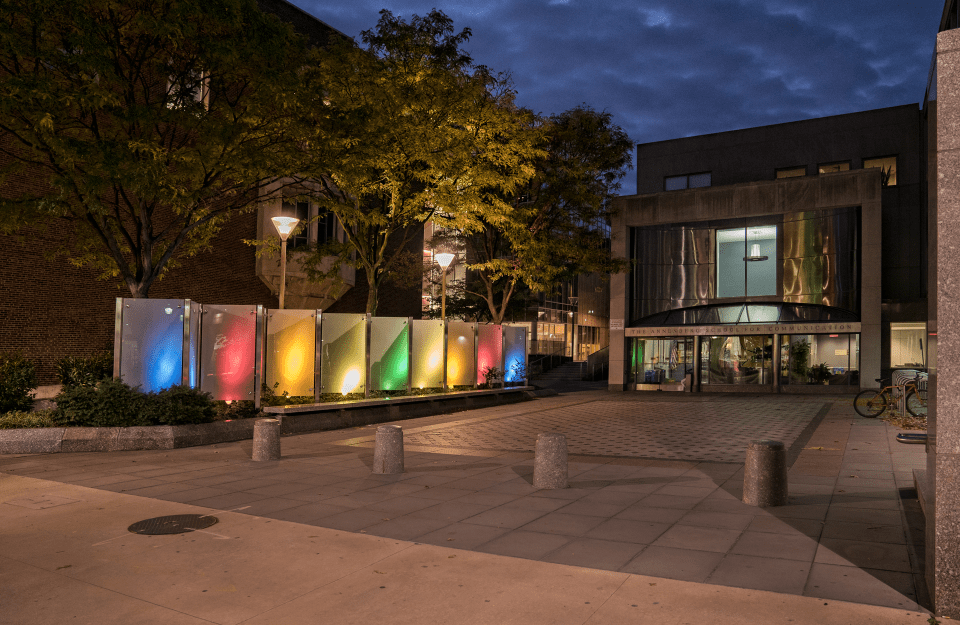Chatman, Ristovska Named 2016-18 George Gerbner Postdoctoral Fellows
Chatman is a recent graduate of USC's Annenberg School, and Ristovska recently graduated from the Annenberg School at Penn.

For the first time since the fellowship began in 2007, the Annenberg School for Communication at the University of Pennsylvania has named two George Gerbner Postdoctoral Fellows: Dayna Chatman and Sandra Ristovska.
Both will receive their Ph.D. degrees this Spring: Chatman from the University of Southern California Annenberg School for Communication and Journalism and Ristovska from the Annenberg School at Penn.
Dayna Chatman
A native of California, Chatman earned her Bachelor of Arts in Communication from Saint Mary’s College of California in 2005. Her senior thesis, which explored the mediated effects of Black women viewing fashion and beauty magazines, sparked her interest in research and she moved to Chicago to pursue a Master of Arts degree. While attending the University of Illinois at Chicago, Chatman majored in Communication with a concentration in Gender and Women’s Studies.
Chatman then went on to the doctoral program at USC’s Annenberg School of Communication and Journalism where she focused on exploring Black women’s media visibility and representation in popular culture. She has published her research in Feminist Media Studies and in the forthcoming second edition of Fandom: Identities and Communities in a Mediated World (New York University Press).
Chatman’s research attempts to re-frame, both theoretically and methodologically, the study of Black women's representation in contemporary media. Recognizing that television texts featuring Black women are often studied in isolation from the political economic context of their production, and from the perspective of their reception amongst Black audiences, her research illustrates the necessity of applying a multidimensional approach to the study of Black women's depictions in media.
Additionally, her work situates both race and gender as elements that require more consideration in studies about the institutional, economic, and technological changes that have occurred in television during the twenty-first century.
As a Gerbner Fellow, Chatman will continue to study discourses of race and gender that manifest in the development and production of television programs that feature Black women in lead roles, and Black fans’ online engagement with and community building around such programs.
Sandra Ristovska
Sandra Ristovska is a documentary filmmaker and a Ph.D. candidate in Communication at the Annenberg School for Communication, University of Pennsylvania. She sees her research and filmmaking as interrelated endeavors through which she explores the role of visual media in achieving social justice and human rights.
Ristovska’s dissertation project examines the institutionalization and professionalization of video activism by human rights organizations as facilitated by unfolding changes in technology, advocacy, journalism and law. Looking at the work of WITNESS, Human Rights Watch, Amnesty International and the International Criminal Tribunal for the former Yugoslavia (ICTY), it shows how the patterns of professionalization are creating a proxy profession that brokers between the public and various institutions of democracy.
Ristovska is a recipient of the 2013 Top Paper Award from the Philosophy, Theory and Critique Division at the International Communication Association (ICA) and the Herbert Schiller Prize from the International Association for Media and Communication Research (IAMCR). She is a visiting scholar at the Institute for the Study of Human Rights at Columbia University and a fellow at the Center for Media, Data & Society at the Central European University. In addition, she serves as a co-chair of IAMCR's Emerging Scholars Network Section and as a co-director of CAMRA, an interdisciplinary media collective at the University of Pennsylvania.
Her most recent documentary film credits include Fieldtrip (director), which follows a graduating middle school cohort from People for People Charter School on their cultural immersion trip in Puerto Rico (in post-production) and Filming for Democracy in Myanmar (cinematographer), which looks at the film industry in the country as influenced by the political changes post-2011.
As a Gerbner fellow, Ristovska plants to turn her dissertation into a book manuscript as well as teach an undergraduate course on visual culture and human rights in the spring of 2017.
In addition, Ristovska will also manage the Visual Law Project at the Yale Law School Information Society Project during the 2016-17 academic year.
About the George Gerbner Postdoctoral Fellowship
Begun in 2007, the Gerbner Post-Doctoral Fellowship Program was established in honor of the former dean of the Annenberg School for Communication.
Gerbner Fellows are drawn from an outstanding pool of recent or soon-to-be graduates from the University of Southern California's Annenberg School for Communication and Journalism or the Annenberg School for Communication at the University of Pennsylvania.
Fellows serve two-year terms, and teach one undergraduate class per year in addition to pursuing their own research.



